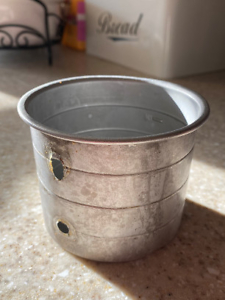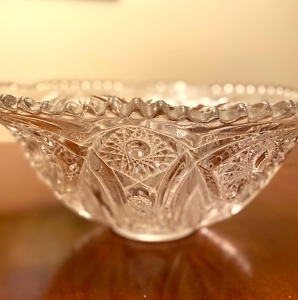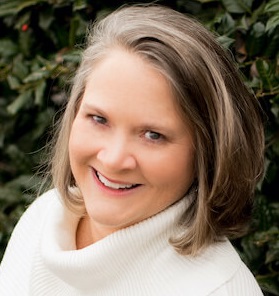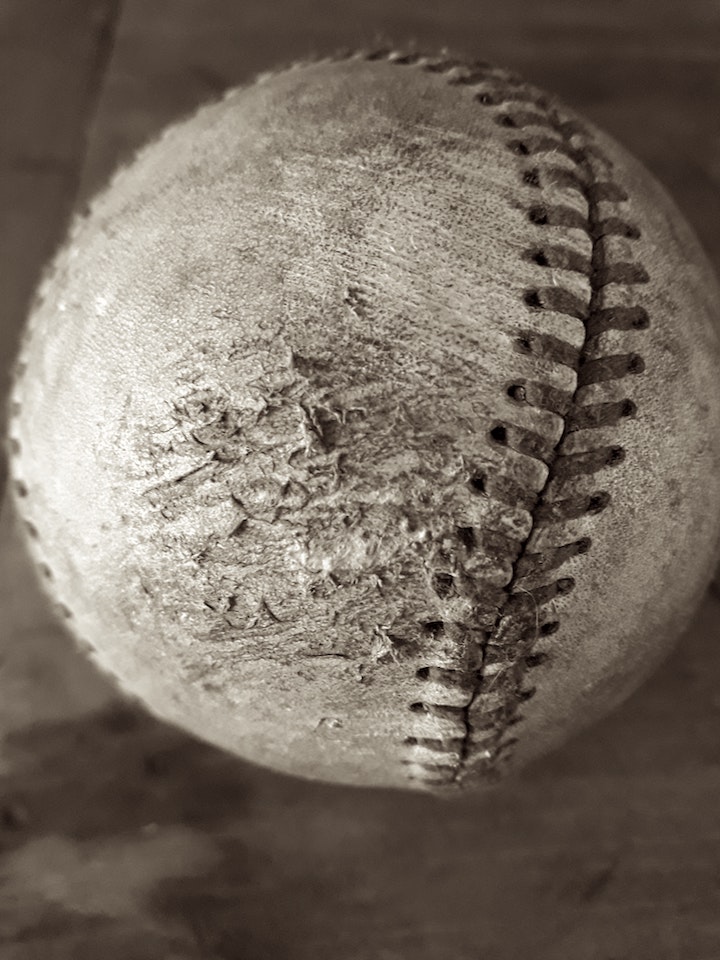Holding On
Little objects touch something tucked far away in the recesses of our hearts
It was one of those objects that would probably not fetch more than a dime at a yard sale. The aluminum measuring cup was scuffed from so many years of use and had no value — except to me. That’s why when its handle fell off, my reaction was totally unreasonable. Cradling the dismembered handle like a Fabergé egg, I asked my husband if he could glue it back on. In exchange I got the you’ve-got-to-be-kidding-me eye roll. I took that as a no.
 In recent years, the measuring cup — circa 1960, holding two cups at full capacity — had resided in our Tupperware bin of dry dog food. Reese came to eagerly anticipate the sound of aluminum raking across his kibble. Twice a day, the cup did its job, resting for the remainder of the day, for it is an old man.
In recent years, the measuring cup — circa 1960, holding two cups at full capacity — had resided in our Tupperware bin of dry dog food. Reese came to eagerly anticipate the sound of aluminum raking across his kibble. Twice a day, the cup did its job, resting for the remainder of the day, for it is an old man.
Isn’t it odd how we become attached to little objects we wouldn’t even presume to call possessions — those items that would never make their way onto our necessities-if-stranded-on-a-desert-island list? Yet they somehow touch something tucked far away in the recesses of our hearts. And we smile.
This particular measuring cup was a staple in my mother’s kitchen — the conduit for homemade oatmeal cookies, birthday cakes, and butterscotch brownies. I recall stealing it from the dish drainer to use in my pink plastic toy kitchen. I also used it on the day I made my first non-Easy Bake oven, real banana bread. Never have I felt such anticipation as when my mother lifted the bread out of the big oven for me. On tiptoes I peered into the pan, only to find a thin layer of burnt goo. I had carefully used my measuring cup friend for the required sugar but in my excitement neglected the requisite flour. The pan was unsalvageable, but Mom and I had a good laugh together at my expense.
That kitchen had black and white tiles, and my mother’s apron had red rickrack around the border. Of course, I don’t think of all these things every time I go to feed the dog, but somewhere in my head, in my heart, those images linger. They are unrequested blessings cushioning my day.
With my husband no help, I decided to continue using the measuring cup minus the handle. It still scooped, after all. Twice, however, an edge of jagged metal has caught my finger. I’m not sure how much more I can bleed. I took a heavy-duty nail file and shaved the roughness, all the time wondering if it might not be time to retire that measuring cup.
 There are more valuable items in our house that I can never relinquish. There’s my great-aunt Liza’s cut-glass punch bowl that holds court in the middle of our dining room table. When I was little — probably around the same age that I was scorching bananas — my great-aunt Jessie routinely took me to spend the day with her at her sister Liza’s. (Our family had elderly relatives in spades, most of them unmarried or widowed.) Perhaps this sounds like a dreadful way for a child to pass time, but I looked forward to those days. Although Aunt Liza was in a wheelchair and didn’t say much, she listened patiently as I told her all my dolls’ names and life stories. Jessie made us little cucumber sandwiches and pimento cheese on crackers with olives and bread and butter chunks as garnishes, and we would eat on willow ware china atop TV trays while watching a soap opera I did not understand. Sweet tea was served in delicate crystal glasses, and I felt so very adult.
There are more valuable items in our house that I can never relinquish. There’s my great-aunt Liza’s cut-glass punch bowl that holds court in the middle of our dining room table. When I was little — probably around the same age that I was scorching bananas — my great-aunt Jessie routinely took me to spend the day with her at her sister Liza’s. (Our family had elderly relatives in spades, most of them unmarried or widowed.) Perhaps this sounds like a dreadful way for a child to pass time, but I looked forward to those days. Although Aunt Liza was in a wheelchair and didn’t say much, she listened patiently as I told her all my dolls’ names and life stories. Jessie made us little cucumber sandwiches and pimento cheese on crackers with olives and bread and butter chunks as garnishes, and we would eat on willow ware china atop TV trays while watching a soap opera I did not understand. Sweet tea was served in delicate crystal glasses, and I felt so very adult.
I remember vividly the punch bowl on Aunt Liza’s buffet. While Jessie was out of the room, I used the embroidered tapestry stool to reach the bowl. There I hopped up and down, serving imaginary punch to my dolls.
“I’d love some punch too,” Aunt Liza said. Jessie reentered the room and cautioned me against playing with such a valuable beauty.
“It’s not a toy,” she scolded.
“Hush,” Aunt Liza admonished. “Let her play.”
When Aunt Liza passed away, to my great delight she left a note in her will that I was to inherit her punch bowl and cups. To this day it is one of the objects I’d run back into a burning house after. I doubt it’s very valuable, except to me. Because, you see, only I know the sweetness of the punch that lived inside — just as only in my mind can I see my mom’s delicate fingers scaling the top of that old measuring cup, leveling the flour for my birthday cake.
We hold on to odd pieces and parts of our childhoods because, in some way we can’t articulate and don’t even fully realize, they remind us of who and whose we are. They tell our stories. I can no longer perch on the high metal stool in my mom’s black and white kitchen, watching her cook and bake, and I can no longer listen to my great-aunts mutter about soap opera divas. I have to put on business attire, check my calendars, pump gas, buy shampoo, endure mammograms, pay my bills, weed through emails. Although I fully inhabit the adult realm of responsibility, every now and then a nick on my finger is well worth the momentary flash of youth it inspires.
Does holding on mean not letting go? Maybe the two are not mutually exclusive. Perhaps carrying these trivial, fleeting daily reminders — both tactile and intangible — in the hidden pockets of our hearts is what empowers us to move on. To grow.
I was once a child and now I’m not, and those who raised me have passed on. Such is the cycle of life, and I’m at peace with that. But that doesn’t preclude me holding on to that little girl somewhere deep within.
She made the best punch.

Copyright © 2021 by Melissa Norton Carro. All rights reserved. A native Tennessean, Melissa Norton Carro has over 20 years of experience in communications. She received her B.A. with honors from Vanderbilt University, where she currently works. A closet fiction writer for years while raising three daughters, Carro writes a blog, In the Middle, about life in the sandwich generation. Mt. Moriah’s Wake is her first novel, and she is working on another.


